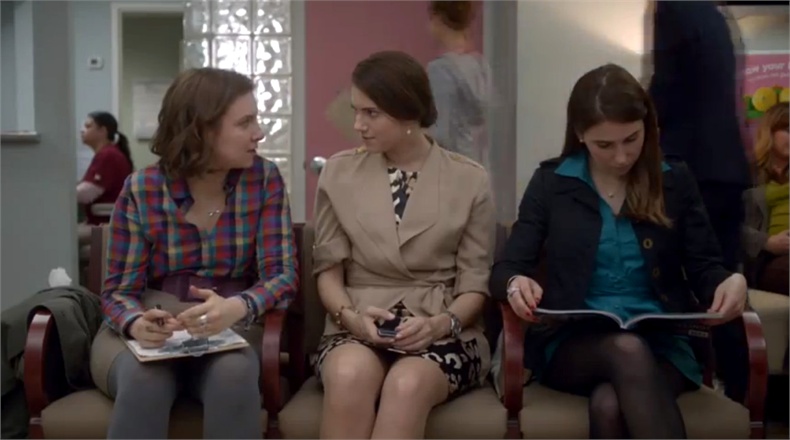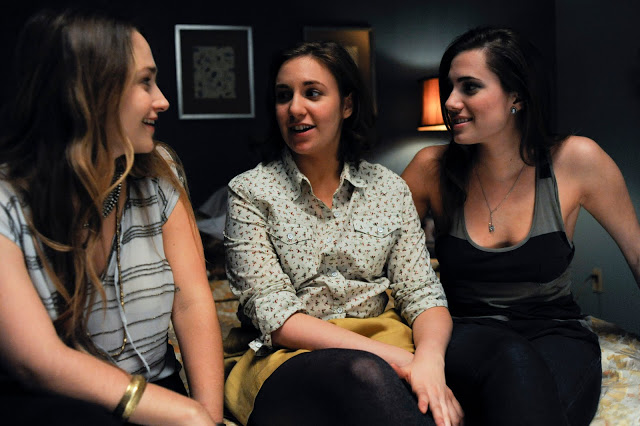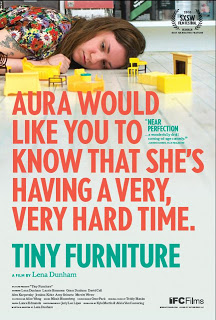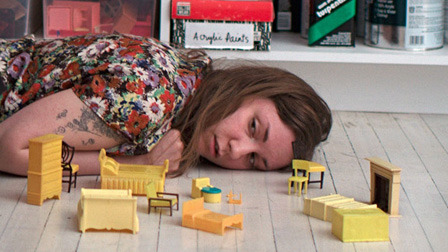 |
| (L-R): Hanna (Lena Dunham), Allison Williams (Marnie), Zosia Mamet (Shoshanna) in Girls |
Vacillating between vitriolic condemnation and laudable praise, Lena Dunham’s
Girls has dominated pop culture dialogue.
I eagerly anticipated the serie’s premiere. Yes, the show depicts economically privileged characters. Yes, the incredibly white and homogenous cast should be more diverse. And yes, staff writer Lesley Arfin is absolutely a racist asshole who’s bullshit must be called out. All of these rightfully scathing critiques are not only valid but crucial. But a mere 2 episodes in,
Girls portrays potentially nuanced female characters with candid dialogue on sex, friendship, aspirations and relationships. And abortion! Huzzah!
Many critics compare
Girls with
Sex and the City. Both HBO series revolve around 4 female friends in NYC who talk openly about sex, career goals and relationships.
Dunham herself addresses the parallels. Although she feels
SATC portrays aspirational female friendships whereas
Girls, which is messier and more awkward (kind of like real-life), depicts nurturing friendships still fraught with “jealousy and anxiety and posturing.” It’s also hard not to compare as
both trendy series tackled abortion.
In the latest episode of
Girls, the hilariously titled “Vagina Panic” (which seriously sounds like something I would declare to my friends), centers around abortion, atrociously bad sex and STDs. When Hannah (Lena Dunham) tells Adam, the despicable douchebag she’s hooking up with that she’s accompanying her friend Jessa (Jemima Kirke,
who’s had an abortion in real-life) to have an abortion (we found out she was pregnant at the end of the first episode), she says, “How big a deal are these things actually.” Hannah then talks about not having “sympathy” for people who don’t use condoms. Yet it’s great that she’s still supporting her friend.
Later in the episode, while sitting on a bench eating ice cream, Shoshonna (Zosia Mamet) whips out the book Listen, Ladies: A Tough Love Approach to the Tough Game of Love (yikes!) — a la SATC’s Charlotte and reminiscent of that bullshit book The Rules. Hannah says she “hate read” it and then they start hilariously debating who precisely constitutes “the ladies.” (Hmmm, should I stop calling my female friends “ladies??”) Irritated, Jessa tells Hannah:
I’m offended by all the supposed to’s. I don’t like women telling other women what to do or how to do it or when to do it. Every time I have sex, it’s my choice.”
Yes, yes, yes! It’s great Jessa says a proverbial fuck you to the things she’s supposed to do in life. She declares that what she does with her body is her choice. Hannah then asks Jessa if she’s scared or angry or sad. Jessa tells her she’s not some character from one of her novels and says eventually wants to have children and that she’ll be a great mother.
When the women go to the Soho Women’s Clinic to support Jessa, who’s blowing off her abortion by drinking White Russians at a bar, Hannah, Marnie (Allison Williams) and Shoshanna discuss STDs, the play Rent, infertility, condoms, abortion and virginity. Hannah tells Marnie, who’s pissed Jessa hasn’t shown up:
“You’re a really good friend and you threw a really good abortion.”
The effortless weaving of a frank discussion of sexuality with effacing humor on a topic like abortion felt authentic. Hannah gets an STD test at the clinic and veers off into an awkward, cringe-worthy yet weirdly humorous diatribe on fearing AIDs…and then wanting AIDS, so not funny. Meanwhile, Jessa makes out with a guy at the bar. When she tells him to put his hands down her pants, her tells her she’s bleeding.
Girls which “
pushes the envelope” the entire episode, ultimately cheats, evading the actual decision as Jessa either gets her period or has a miscarriage.
“SATC uses Samantha’s quest for a Birkin as comic relief after a lot of heavy abortion talk. But in Girls, the abortion talk is the comic relief.”
In SATC‘s “Shoulda, Woulda, Coulda,” one of my favorite episodes, Miranda (Cynthia Nixon) contemplates an abortion after an accidental pregnancy. While telling her friends, Samantha (Kim Cattrall) irreverently reveals she’s had two abortions while Carrie (Sarah Jessica Parker) had one when she was 22. Even though Miranda doesn’t go through with the procedure (and I totally wish she had), I liked that 2 out of the 4 characters had an abortion. Within that brief episode, we see multiple reactions to abortion. Miranda feels conflicted. Charlotte (Kristen Davis) grapples with infertility. Samantha exudes a casual nonchalance and forthright approach to abortion which I found refreshing. Carrie, who knows she made the right choice, lies to her boyfriend Aiden when he asks her if she’s ever had one, worried he’ll judge her for her choice.
Therein lies the difference between Girls and SATC. What SATC always excelled at was showcasing various perspectives on an issue, albeit from all from a privileged lens. But Girls doesn’t do that here.
While they support Jessa, Hannah and Marnie are critical of people’s choices and mistakes. Hannah apologizes for her seemingly “flippant” attitude towards abortion, saying it stems from her condemnation for people who don’t use contraception. Marnie appears to denounce abortion (all while rallying the women at the clinic) saying it’s “the most traumatic thing that can ever happen to a woman.” Really?? Although maybe from her character’s perspective it is. But the argument could easily be made that if we had seen the
SATC characters 10 years younger, the age of
Girls’ characters, perhaps we would have witnessed similar reactions. And maybe that’s the point. These young women make so many mistakes; maybe they’ll become less judgmental as they get older. But it still annoys me as it seems to reek of the “I’m pro-choice but I would never have an abortion” attitude that sometimes plagues pro-choice dialogue,
playing into the stigma that abortion is bad.
I always adored SATC for the way the women transcended friendship, nurturing and validating each other, and became a family. Girlsmay be more realistic in its depictions of simultaneous annoyance yet support for friends. But ultimately, abortion, which 1 in 3 women have had, doesn’t occur on either show which is unfortunate. But at least SATCcontained 2 characters who had abortions in their early 20s, the same age as the characters on Girls. From what we know, and granted it’s still early on, the Girls characters have not. For a show that revels in bold candor and raw honesty, it would have been fantastic to witness an abortion.
Despite the ending, my friend
Sarah at Abortion Gang deems
Girls’ abortion plot a success as it engages in abortion dialogue:
“But even if the ending of Jessa’s pregnancy is a copout, we still got close to thirty minutes of frank discussion of abortion. Which means Girls has given us, oh, twenty-seven more minutes of abortion talk than any other show this year, even shows that purport to be about the lives of women.”
Don’t get me wrong. It’s awesome to hear abortion uttered so many times on the show. While I’m delighted Girls talks about abortion so easily and frequently, I’m still pissed and annoyed an abortion never transpired. Choosing not to portray an abortion contributes to its insidious stigmatization.
Audiences don’t often expect weighty issues in comedy.
Fem2pt0’s Christina Black asserts the difficulty in finding humor in serious topics like abortion and rape.
Girls attempted humor on both issues in one episode; one successfully, the other not so much. But comedy — and other genres like sci-fi, horror, and fantasy — not only entertains. It can reflect our values and critique society.
I applaud
Girls for raising the issue of abortion so early on, and I adore that Dunham, who wants to talk about feminism and point out misogyny and sexism (hells yeah!), says she’s excited “
the feminism conversation could be cool again.” But I can’t help but feel cheated.
Media shapes our perception of social issues, relationships and ourselves. When film and television so rarely even mentions the full scope of reproductive health, I want abortion depicted honestly, without stigmatization or condemnation. Is that really too much to ask?








